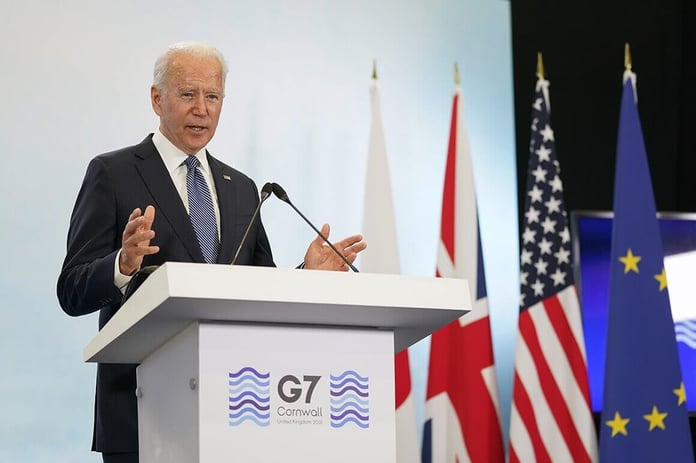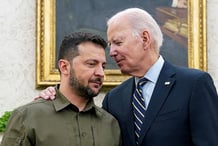
The American president’s European tour continues. After meeting with his G7 colleagues, Joe Biden has an equally important meeting with allies at the NATO summit in Brussels. Russia and China are on the agenda of the talks between the leaders of the North Atlantic Alliance, as well as countering cyber threats and the problems of climate change.
Joe Biden will use the NATO summit to make up for the damage done over the years of Trump, writes The Guardian and reminds: “Three years ago it was Donald Trump who stunned Nato members at a summit in Brussels, warning that he may be prepared to pull the US out of the western military alliance if its other members did not increase their defense spending. ”
Although experts warn that Trump’s legacy will not evaporate so easily, and its consequences will be felt for a long time to come, Biden will have to work to restore trust between the allies. “At least the rhetorical omens are auspicious,” writes The Guardian. – Last week, the US President called Article 5 a “sacred obligation”, according to which an armed attack on one NATO member is considered an attack on all. A similar language and respectful tone, long a trademark of Biden, is expected in the Belgian capital, not least because the US wants NATO, along with the G7, to take a tougher line against Russia, especially with regard to cyberwar, and even China. which has not traditionally been seen as an adversary. ”
Before the summit, US officials said that “this will be the first time NATO countries will address the security issue from China.”
NATO Secretary-General Jens Stoltenberg pledged a new cybersecurity policy and said relations with Russia, where most hacker attacks originate, are at their lowest level since the end of the Cold War.
The Guardian quotes Karin von Hippel, CEO of the think tank at the Royal United Services Institute: “Biden is perhaps the most experienced US president in foreign policy. He truly values alliances and knows that they are needed to solve problems like China. But NATO allies also know that four years in world affairs can go by pretty quickly. They know that Trump or a politician like him may soon return to the presidency. They have to imagine a world that doesn’t have the US all the time. ”
Before Biden’s election, NATO was paralyzed or retreated, writes The Guardian, recalling how three years ago Trump accused German Chancellor Angela Merkel of refusing to spend more on defense and said that NATO allies would have to increase their spending by January 2019.
Biden’s commitment to American militarism is not absolute, The Guardian notes. He followed through on Trump’s announcement of the withdrawal of troops from Afghanistan, although other NATO allies, such as the UK, would have preferred to continue the long peacekeeping mission.
At a press conference on Friday, NATO Secretary-General Jens Stoltenberg was asked if Trump’s absence would allow other members of the alliance to cut defense spending. In his response, he argued that “transatlantic ties in NATO go beyond individual political leaders.”
However, von Hippel warns against overconfident talk at the event: “The threat of a new Trump should make Europeans less complacent.”
However, Sky News notes that now that Donald Trump is not attending the meeting, world leaders will hope for a less hostile atmosphere than at the last NATO summit. And Joe Biden will be in the spotlight at the first NATO Leadership Summit since the start of the pandemic.
The new US leader is expected to reassure NATO of America’s “firm commitment” to collective defense – words that can no longer contrast sharply with those of his predecessor. As Sky News recalls, Donald Trump spent his presidency threatening to withdraw from the alliance and berating allies for not paying their fair share of collective security. “This made the normally carefully organized NATO meetings highly unpredictable and explosive.”
In a sign that the allies are returning to a more harmonious phase, the White House even issued a statement on Sunday in which it outlined the key outcomes of the summit in advance: a new “strategic concept” will “guide the alliance’s approach to a changing strategic environment that includes” aggressive policies and actions. Russia “; “The challenges that the People’s Republic of China presents to our collective security, prosperity, and values”; and “transnational threats such as terrorism, cyber threats and climate change”.
NATO leaders will approve a plan to renew the alliance’s cyber defense and will strive to cope with the planet’s greatest challenge: climate change. As part of this new initiative, NATO will strive to become a leader in “understanding and adapting to the security impacts of climate change,” the White House said in a statement. For example, the likelihood of conflict will increase as countries compete to restrict access to resources such as water.
All Allies’ armed forces will also reduce greenhouse gas emissions from their operations and bases – an area that is currently not well controlled.
While there will be a strong show of unity at the summit, Sky News notes, questions remain, observers say, whether most Allies will have the political will and economic capacity to commit the necessary funds to realize NATO’s future vision, especially during a pandemic.
Despite the relatively short duration of the discussions, the Allies are expected to agree to a lengthy communique that appears to include tightening the language on the challenges China poses, according to three European sources.
China is first mentioned in a communique by NATO leaders after the previous summit hosted by the UK in 2019 when China was identified as a challenge and an opportunity. In eighteen months, the language is expected to provide more insight into how Beijing, with its growing military power, is challenging global democracies, Sky News predicts: “The US is particularly concerned about the threat posed by a growing China when officials blame the ruling Chinese Communist Party of violations of human rights and trying to undermine international rules established after the Second World War. ”
And, of course, Russia will become one of the central topics of the meetings in Brussels. According to the US President’s National Security Advisor Jacob Sullivan, Biden will discuss with allies behind closed doors during the NATO summit the issues related to the upcoming Geneva meeting with President Putin. The head of the White House wishes to come to Geneva, where a meeting with his Russian counterpart is planned, having enlisted the full support and solidarity of allies.













